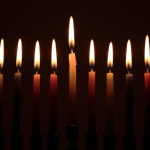Services every Saturday at 10:40 AM
Hanukkah

This feast celebrates the Maccabee’s victory over the Syrian-Greeks and the rededication of the temple in 165 BCE after the Seleucid king Antiochus Epiphanes defiled it by sacrificing a pig on the altar and burning the Scripture scrolls. Hanukkah (or Chanukah) is also known as the Feast of Lights because of the legendary miraculous provision of oil for the eternal light in the temple. After cleansing the Temple, the supply of oil to relight the eternal flame of the menorah (the symbol of G-d’s presence) was only enough to last for one day. But G-d performed a great miracle, and the flame burned for the eight days necessary to purify new oil. Although the history behind Chanukah is recorded in books that were written in the time between the Hebrew Scriptures and the New Testament, the book of John tells us that it was celebrated in Yeshua’s time. (John 10:22-23)
Chanukah is primarily a family celebration that centers around the lighting of a nine-candle menorah, called a Hanukkiyah. Holiday foods include latkes (potato pancakes), and doughnuts (sufganiyot) fried in oil. The oil is a reminder of the miracle of the oil. Children play dreidel (sevivon) games with a top whose Hebrew letters remind them of the great miracle that happened there, “Nes Gadol Haya Sham”.
The story of Chanukah reminds us of G-D’s faithfulness even in the midst of persecution, and our call to be lights in a darkened world. During the time of Antiochus, the Jewish people were called to make a choice. They could bow down to foreign gods and live, or take a stand and lose their lives for worshipping the true and living G-D. Many lost their lives as they stood for truth. May we have the strength to do the same.